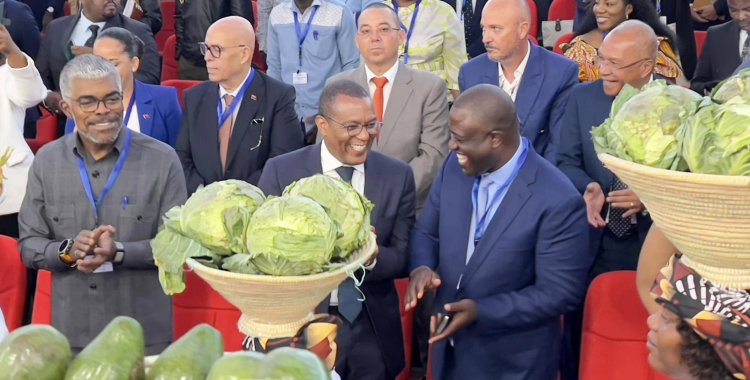Quoted in a statement from the provincial government of Huambo, to which VerAngola had access, the minister argued that the "Lobito Corridor is one of the pillars of the national program for diversifying the economy, achieving food security and integrating internal and regional markets, in a competitive and sustainable manner".
On the occasion, Lima Massano stated that this infrastructure is seen as "a structuring project, generating transformative opportunities and inviting businesspeople and investors to be an active part of the project and that they can count on the institutional support of the Angolan government".
"The government official made it known that the event appears to be opportune given that the Lobito Corridor, an infrastructure for all Angolans with visibility in the international context, has been generating several opportunities and should engage and mobilize everyone, whether in agribusiness or agro-industry and among others, and can export through the corridor and its infrastructures", reads the note.
This railway infrastructure "has proven to be important in combining economic interests between African countries, within the scope of the construction of the continental free trade zone", he pointed out, defending "the creation of an efficient network of transport infrastructures as a central element of competitiveness of economies, facilitating the distribution of goods, access to markets and consumers, as well as the mobility of labor".
The official also highlighted the support that this undertaking has, citing the support of the "sister" countries Zambia and the Democratic Republic of Congo, as well as other entities such as the United States of America, the European Union, among others.
Quoted by Angop, he highlighted that during the project there is arable land, sources of electricity, an abundance of water, as well as young people looking for opportunities, and thus there are fundamental factors to guarantee progress and well-being.
In turn, Pereira Alfredo, governor of Huambo, pointed out that the province wants to actively contribute to the diversification of the country's economy, "creating complementary conditions such as the debureaucratization of public services, so that investors and businesspeople feel comfortable and supported, in front of public servants".
Quoted in the provincial government's statement, Pereira Alfredo also highlighted that Huambo "will take maximum advantage of its favourable geographical and climatic location, contributing to the increase and incentive of national production and productivity, in the main products of choice and diversifying the sources of attracting local investment, as well as actively participating in the national account".
According to the governor, "this event is an opportunity for us to be together in the same space, and to reflect on the paths that will make an issue that affects all of our lives increasingly sustainable."
The Minister of Transport, Ricardo D'Abreu, participated in one of the forum's panels. Speaking at the panel on the "Development Plan along the Lobito Corridor – infrastructure", the Minister of Transport highlighted the advantages of this railway project for the agribusiness sector and the promotion of employment.
Seeing the project as a driver for the insertion of the African continent in global trade and for countries with difficult access to the sea, Ricardo D'Abreu also considered that this undertaking will help in the country's economic growth, with the participation of public and private sectors, covering the countries of Zambia and the Democratic Republic of Congo.
Among other aspects, the minister also highlighted the international support given to this project, such as the United States of America, the European Union, among other countries and institutions.
He considered that these partnerships strengthen the strategic relevance of this corridor in the global panorama, converting it into a connecting link between regional African and international markets, within the scope of the rail transport policy that they can represent for Angola, writes Angop.
The forum served to analyze three panels: "Development Plan along the Lobinho Corridor"; "Lobito Corridor, Today - Productive Sector" and "Facilities and Financing".
In addition to Lima Massano, Ricardo D'Abreu and Pereira Alfredo, the Minister of Public Works, Urbanism and Housing, Carlos dos Santos, among other individuals, were also present.







